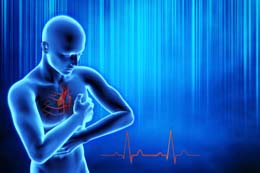Sharp chest pain has become one of the most common health problems faced by people these days. The causes need not always be related to the cardiovascular system.

Chronic chest pain is one of the most scaring symptom a person can have, as it is usually considered to be a signal for a heart attack. Fortunately, sometimes, an acute chest pain may not be related to any kind of heart problem. At times, even the doctors are unable to identify the actual causes of sharp chest pain and whether they are life threatening or not. The causes of chronic or acute chest pain may originate from any part of the body, like lungs, esophagus, stomach, muscles, bone, or skin due to complex nerve distribution in the body.
Cardiac Causes
❑ Heart attack causes a pressure or crushing pain in the chest that may last for a few minutes. The pain may also get distributed to the back, neck, jaw, shoulders, and arms -- especially the left arm. Its symptoms may include shortness of breath, sweating, dizziness, and nausea along with the chest pain.
❑ Angina causes pressure or tightness in the chest that may last for more than a few minutes. It occurs due to physical or emotional stress that leads to restricted flow of blood to the heart.
❑ Inflammation of the sac around the heart, known as pericarditis, leads to sharp, piercing, and acute chest pain. The person may also feel sick and suffer from fever.
❑ Aortic dissection is another cause for sharp chest pain, where the inner layers of the main artery (aorta) separate, forcing blood in between them. It causes a sudden and tearing chest and back pain.
❑ Coronary artery spasm causes extreme chest discomfort as the arteries supplying blood to the heart suffer a spasm by temporarily ceasing the blood flow to the heart.
Non-Cardiac Causes
❑ Heartburn is a non-cardiac cause of sharp chest pain. It is a painful burning sensation that occurs behind the sternum accompanied by a sour taste and a feeling of regurgitation (food re-entering the mouth). It usually happens after a meal and can also last for few hours.
❑ Panic attack can be another reason for acute chest pain accompanied by palpitations, hyperventilation, profuse sweating, and shortness of breath.
❑ Pleurisy is an inflammation of the membrane that lines the chest cavity. It causes severe chest pain that becomes worse, especially, when the person inhales or coughs.
❑ Costochondritis is a condition, where the cartilage of the ribcage becomes inflamed. It causes sudden and severe chest pain, and the person may also assume that he is having a heart attack.
❑ Achalasia is a swallowing disorder in which the lower esophagus valve doesn't open properly, hence not permitting the food to enter the stomach. As a result, the food backs up into the esophagus, which inadvertently causes chest pain.
❑ It is when the pulmonary artery suffers a blood clot that the blood flow through the lung is hampered. This condition is known as Pulmonary Embolism.
❑ Chest pain may also be caused due to a condition referred to as collapsed lung. The chest pain is characterized by being fulminant in nature, escalating the discomfort, when it stretches for a considerable patch of time. This condition occurs, when air occupies all the space existing between ribs and the lung, thereby leading the lung to partially, or completely collapse. Also known as Pneumothorax, this medical emergency occurs due to the chest wall suffering an injury.
❑ Pulmonary hypertension may also produce chest pain. When the arteries transfuse blood to the lungs bearing the tension of high blood pressure, severe chest pain would be the result.
❑ Shingles is a disorder caused by the chickenpox virus, showing symptoms, like sharp chest pain and a band of blisters from the back around the chest wall.
❑ Gallbladder, or pancreas problems can be another cause, including symptoms, like acute abdominal pain that radiates to the chest.
Sore muscles, esophageal spasms, injured ribs, or pinching nerves are some other causes of chronic or acute chest pain. If you ever experience any kind of acute pain, crushing, squeezing, or pressure in your chest that lasts for more than a few minutes and slowly deviate to your neck, shoulder or arms, don't ignore it, and seek necessary medical help.
Disclaimer:
The article published herein, is meant to accomplish pedagogical purposes only. The recommendations mentioned hereby may not be generically applicable. The information, by no means, intends to supplant the diagnosis and advice imparted by the medical practitioner.


 Chronic chest pain is one of the most scaring symptom a person can have, as it is usually considered to be a signal for a heart attack. Fortunately, sometimes, an acute chest pain may not be related to any kind of heart problem. At times, even the doctors are unable to identify the actual causes of sharp chest pain and whether they are life threatening or not. The causes of chronic or acute chest pain may originate from any part of the body, like lungs, esophagus, stomach, muscles, bone, or skin due to complex nerve distribution in the body.
Chronic chest pain is one of the most scaring symptom a person can have, as it is usually considered to be a signal for a heart attack. Fortunately, sometimes, an acute chest pain may not be related to any kind of heart problem. At times, even the doctors are unable to identify the actual causes of sharp chest pain and whether they are life threatening or not. The causes of chronic or acute chest pain may originate from any part of the body, like lungs, esophagus, stomach, muscles, bone, or skin due to complex nerve distribution in the body.